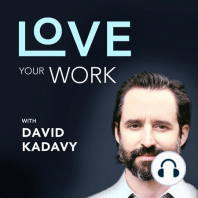56 min listen

117. Maneesh Sethi: Upgrade Humanity. (Can blockchain & cryptocurrency end the eyeball economy?)
FromLove Your Work
117. Maneesh Sethi: Upgrade Humanity. (Can blockchain & cryptocurrency end the eyeball economy?)
FromLove Your Work
ratings:
Length:
100 minutes
Released:
Mar 15, 2018
Format:
Podcast episode
Description
I'm very glad to have my friend Maneesh Sethi back on the show. You first heard Maneesh way back on episode 13. Maneesh is the founder of Pavlok. Pavlok started out as a wearable device that shocks you out of breaking bad habits. You may have heard me talk about using [Pavlok] to break my Facebook habit. It's very effective, because being shocked is not pleasant. But what really excites me about what Maneesh is doing is he has a much larger mission. He says he wants Pavlok to "upgrade humanity." He wants to use technology to change behavior for the better. The broken economics of technology products The ill effects and broken economics of technology is a topic I've talked about often. I dreamt of a "behavioral revolution" wherein technology might change behavior for the better, back on episode 22. But, I lamented that the economics were broken, something I debated with Nir Eyal, who is author of Hooked: How to Build Habit-Forming Products back on episode 21. Silicon Valley's ideas for how to fix technology Now here's where I go on a long aside, and I might sound a little more angry than usual, but I think it's important. Three years now after I first wrote about the behavioral revolution, there's starting to be buzz in the mainstream media about the ill effects of technology. I think the most recent election and the rise of fake news made people take notice, and they're starting to get it. There was a recent piece in the New York Times, "Early Facebook and Google Employees Form Coalition to Fight What They Built," wherein many Silicon Valley elites are featured, talking about their "union of concerned experts called 'Center for Humane Technology.'" Truthfully, I didn't read the whole article. Their mission is noble, but my general understanding of the topic is that they believe there should be a sort of designer's "code of ethics," that product designers would somehow magically follow. I say this because I've long been familiar with the work of Tristan Harris, who is the founder of the Center for Humane Technology. Tristan used to be an in-house ethicist at Google. I did invite Tristan to be on the podcast a couple of years ago. There was talk of him coming on, but I think it eventually fell through the cracks for him. He's obviously had no problem finding more press exposure, with this New York Times piece. He was even on Sam Harris's podcast, so you can listen to that one if you want to learn more. I don't have anything to add to that conversation, though I was annoyed that the conversation was entirely focused on this idea of ethics, and there was no talk of the economics that force the hands of tech companies and the people who work at them. Fix the economics of digital distraction I believe ethics can only take you so far. As long as there are big companies that answer to shareholders, what is profitable will be what gets done. The larger an organization becomes, the less you can rely upon the consciences of the individual actors. I shouldn't be surprised that the Silicon Valley elite are calling attention to themselves over the very problems they created, and coming up with what I think are hamfisted solutions for those problems. After all, those of us with a conscience refused to do the damage in the first place. I left Silicon Valley more than ten years ago. It would be revisionist to say it was because of the damage technology was going to do. I didn't know precisely where technology would lead, but I did know that after being involved in the initial excitement of the Web 2.0 movement, which was all about using technology to connect people, my work in tech felt increasingly without purpose nor positive impact. I talked more about these feelings in episode 16, entitled Earn it. So, if the Silicon Valley elite had been able to detect the vacuousness of the companies they were building, if their hunger for meaning had been stronger than their hunger for wealth, they wouldn't be in the positions they are in. And since
Released:
Mar 15, 2018
Format:
Podcast episode
Titles in the series (100)
21. Nir Eyal – Is Silicon Valley Leading Us Into The Robot Apocalypse? Artificial Intelligence, digital distraction, & the dangers of habit-forming products: Nir Eyal is the author of Hooked: How to Build Habit-Forming Products. So he is really manufacturing the drug. Fortunately, he's also concerned about the implications of digital distraction, so he agreed to have a discussion with me about it on the... by Love Your Work